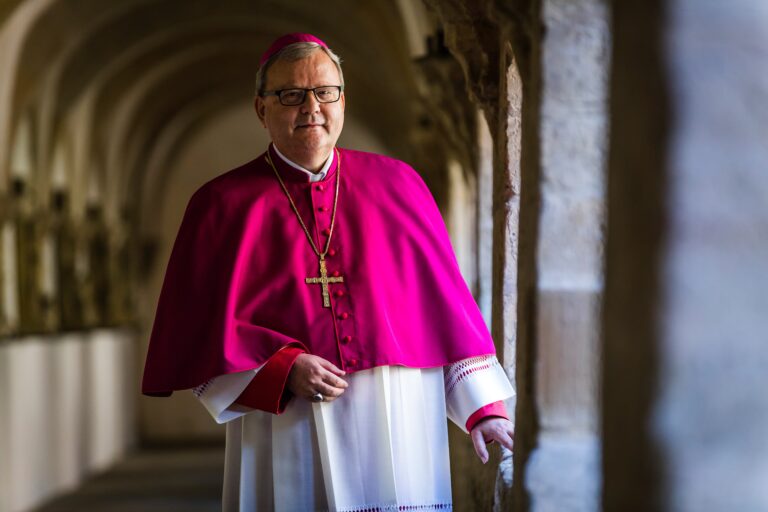The vice-president of the German Bishops’ Conference, Osnabrueck Bishop Franz-Josef Bode, has become the first German bishop to resign over errors made in the handling of sexual abuse cases. His step has earned him a lot of praise from the president of the Bishops’ Conference and from the Church associations.
At the weekend, the Vatican made the surprise announcement that the Pope had accepted the resignation of the vice-president of the Bishops’ Conference who is also a leading representative of the Synodal Path reform project.
The move by the bishop of the northern German diocese of Osnabrueck, who is regarded as progressive, was met with expressions of respect and regret. To date, the Pope has rejected the resignations of other German bishops, including Munich Cardinal Reinhard Marx and Hamburg Archbishop Stefan Hesse. Francis has yet to decide on the resignation offer submitted by Cologne Cardinal Rainer Maria Woelki.
Bode, 72, said he was resigning primarily because of his own mistakes in the reappraisal of sexual abuse cases. He also said his “increasingly poor health” would prevent him from remaining in his post until he reached the standard retirement age of 75.
Bode became an auxiliary bishop in Paderborn in 1991 and was appointed bishop of Osnabrueck in 1995. He has recently pushed ahead with reform projects of the Synodal Path and said he wanted to implement the resolutions swiftly in his diocese, including providing blessing ceremonies for same-sex couples and remarried divorcees. He also repeatedly advocated giving laypeople and women more important roles in the Catholic Church.
Bode said the report published last September on the reappraisal of sexualised violence “once again clearly showed me my own mistakes in dealing with cases of abuse”. He acknowledged his responsibility as a bishop and that he had not paid enough attention to the victims for a long time. “Today I can only ask all victims again to forgive me.”
In December, Bode had still ruled out resigning. At the time, he was confronted with a research report that accused him of shortcomings in dealing with abuse cases. As a result of the accusations, victims filed a complaint under Church law. It is not yet known whether the Vatican then initiated an investigation which might have resulted in the bishop’s removal.
The president of the Bishops’ Conference, Bishop Georg Baetzing, expressed “great regret and respect” at Bode’s resignation. “I would have liked to see you at our side in the German Bishops’ Conference for more years. At the same time, I understand your decision and the consequences it entails. From the bottom of my heart, I express my thanks and appreciation for your work, both personally and on behalf of the German Bishops’ Conference,” Bishop Baetzing wrote to Bishop Bode. He added: “You have experienced more than 60 plenary assemblies over the more than three decades of your episcopal ministry. In addition, there were around 135 meetings of the Permanent Council … The task is certain to have been difficult for you at times and your health suffered as a result. But to this day you have lived up to the tasks and challenges with heart and soul.”
Baetzing added that Bode had taken responsibility for the “issue of sexual abuse which has accompanied us all for a long time”. Other bishops and the Central Committee of German Catholics (ZdK) also expressed respect and regret. At the same time, they thanked Bode for his work towards reforms in the Church.
There was criticism, however, from groups representing victims. Bode should have resigned earlier, Matthias Katsch of the victims’ association “Eckiger Tisch” (Non-Round Table) told Germany’s Catholic News Agency (KNA).
The German government’s independent commissioner for sexual abuse issues, Kerstin Claus, told KNA that it should be clear that Bode was “by far not the only Catholic functionary who has not lived up to his responsibility in this matter”.
The spokesman for the victims’ advisory board at the German Bishops’ Conference, Johannes Norpoth, noted that “the ranks of reform-minded bishops in the German Bishops’ Conference are being weakened further”.
Secular media were more critical of Bode’s behaviour. “It has made it glaringly clear how far the Catholic Church still falls short of its own standards, not least when it seems politically opportune to do so,” the newspaper Die Welt commented.
There was an impression of double standards as Bode had been able to trust that public pressure on him, as a vocal reformer, would never be as great as on a conservative like Cardinal Rainer Maria Woelki of Cologne, Die Welt added. While the criticism of Woelki was justified, Bode’s resignation was also appropriate and belated. “The Church will not regain one iota of credibility if it decides only along the lines of the respective political camps and theological orientations which scandal it finds worthy of punishment and which one is tolerable. That must be the lesson of the Bode case,” Die Welt commented.
Originally reported by KNA Germany.



